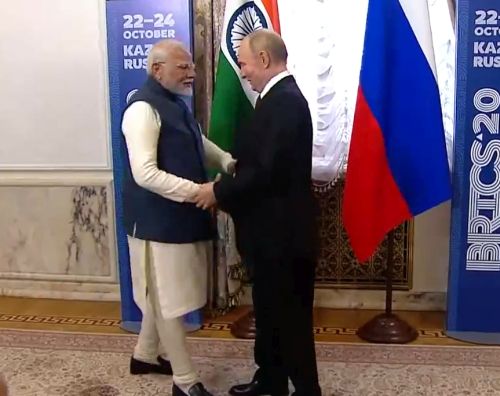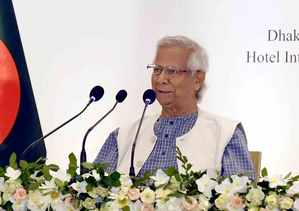International
Will hardliner-reformist face-off in Iran's Presidential poll draw disenchanted voters to poll booths? (2nd Lead)
New Delhi, June 27 (IANS) With Iran set to hold snap polls on Friday to elect the successor to late President Ebrahim Raisi, the contest, shaping up as a three-way race between two hardliners and a conservative, will head into a run-off, as per various surveys. However, they vary on the final positions of the contenders.
A bigger concern is the turnout. Authorities hope for a heavier ‘legitimising’ turnout, given the unprecedented low percentage of voting in the 2021 elections and parliamentary polls earlier this year.
A day before the election, four of the six approved candidates – three four hardliners/conservatives, of various intensities, and a reformist – remain in the race.
The top three contenders are former chief nuclear negotiator Saeed Jalili, Majles Speaker and former Tehran Mayor Mohammad Baqer Qalibaf (both hardliners), and cardiac surgeon Masoud Pezeshkian, who served as a minister in the Khatami regime (reformist).
Like some previous instances, some hardline candidates dropped out to coalesce support behind one strong (hardline) candidate.
The first was Vice President and Foundation of Martyrs and Veteran Affairs head Amir-Hossein Ghazizadeh Hashemi on late Wednesday and then, Tehran Mayor Alireza Zakani on Thursday.
However, both, whose support was in single digits, did not express a choice between Jalili or Qalibaf.
Cleric and former Minister Mostafa Pourmohammadi remains in the race.
The turnout will be key. In 2021 – when Raisi won – it was 48.8 per cent – the lowest ever so far since the 1979 revolution. It came down to around 41 per cent in the two-round Majles election in March and May this year. Part of the disenchantment of voters is over social and economic issues and the debarment of reformist candidates.
However, known reformists like Ali Larijani and Eshaq Jahangiri or mavericks like former President Mahmoud Ahmadinejad were not allowed to contest this time too.
The predicted turnout, as per the surveys and analyses, depends on the orientation of the pollsters or analysts. Those by emigres, largely hostile to the present Iranian dispensation, claim a much lower turnout this time, but in-country groups, related to government institutions, are more sanguine, reporting a slight bump up.
However, they also do not predict any radical breakout.
It was perhaps for this that Supreme Leader Ayatollah Ali Khamenei on Tuesday called for a “maximum” voter turnout in a message to the country’s “enemies”.
“The Islamic Republic has enemies. One thing that helps the Islamic Republic overcome its enemies is the elections. If a good turnout is seen in these elections, then it will make the Islamic Republic proud,” he said in his address at a religious function.
On the candidates, the Iranian Students Polling Agency (ISPA), affiliated with the government’s Academic Centre of Education, Research, and Culture, in a survey published on Wednesday last week, forecast a 50 per cent turnout with Jalili first, and Pezeshkian second – slightly ahead of Qalibaf.
However, an update on Monday had Pezeshkian leading over Jalili, albeit by a small margin, while Qalibaf stayed in third place.
In both, none of the leading candidates was even the 30 per cent mark, indicating a run-off.
Meta, a polling organisation in the Imam Sadeq University in Tehran, in its survey published last week, had also forecast just over 50 per cent turnout, with Pezeshkian ahead – but over Qalibaf, while Jalili was in third place.
An update this week had the same positioning but with lower percentages, and claimed that in a run-off, Qalibaf would beat Pezeshkian, and Jalili too in a run-off.
A survey by the “privately-run” Shenaakht, published mid-June, predicted well over 50 per cent turnout, and Qalibaf on top and both Pezeshkian and Jalili tied in second place – over 10 percentage points behind.
While for Jalili and Qalibaf, their closeness to Supreme Leader Khamenei and the IRGC background could weigh in their favour with their establishment and conservatives, Pezeshkian, whose presence seems geared at drawing reformist voters, may find the going tough, unless there is a massive turnout in his favour.
Despite endorsements by former Presidents Mohammad Khatami and Hasan Rouhani and Foreign Minister Javed Zarif, his ethnic background – being an Azeri – could also cloud his chances. And then, his recent statements supporting Iran’s return to the nuclear deal and wider outreach to the West drew veiled censure from the Supreme Leader, who was scornful of those believing that “everything good comes from the US”. The other two peg more hopes on the region and from BRICS and the SCO.
Pezeshkian also strayed from prevalent consensus by expressing support for Ukraine in its conflict with Russia.
But, no matter who wins, any radical change in domestic and foreign policies is unlikely since the President is only the second in command. Also, the Supreme Leader has to certify the winner first.
(Vikas Datta can be contacted at vikas.d@ians.in)
–IANS
vd/
International
Lee Hsien Yang seeks refuge in United Kingdom

Lee Hsien Yang, the youngest son of Singapore’s founding father, the late Lee Kuan Yew, announced on Tuesday that he is now a political refugee in the United Kingdom after seeking asylum from the British government “as a last resort.”
“I remain a Singapore citizen and hope that someday it will be safe to return home,” Lee stated in a Facebook post, as reported by Channel News Asia (CNA).
Citing what he described as the Singapore government’s “attacks” against him, Lee, who is the younger brother of former Prime Minister Lee Hsien Loong, revealed that he sought asylum protection in 2022.
Lee Hsien Yang and his late sister, Lee Wei Ling, who passed away earlier this month, have been in conflict with their brother Lee Hsien Loong over the fate of their father’s home following his death in 2015, resulting in a public dispute that has estranged the siblings.
In an interview with the UK-based newspaper The Guardian, Lee alleged that a “campaign of persecution” compelled him to seek asylum in Britain.
In response to his claims, the Singapore government stated that there is “no basis” for his allegations of “a campaign of persecution” or other assertions regarding political repression in the country.
“Singapore’s judiciary is impartial and makes decisions independently. This is why Singaporeans have a high level of trust in the judiciary,” a government spokesperson remarked.
The spokesperson added that there are no legal restrictions preventing Lee and his wife, lawyer Lee Suet Fern, from returning to Singapore. “They are and have always been free to return to Singapore,” the spokesperson said.
Lee and his wife have been outside of Singapore since 2022, having opted not to attend a scheduled police interview regarding potential offenses related to providing false evidence in judicial proceedings concerning their father’s will and the family home.
Lee and his late sister, who had been living at the property, alleged they felt threatened while trying to fulfill their father’s wish to demolish the house. They also accused their elder brother, former Prime Minister Lee Hsien Loong, of abusing his governmental influence to advance his personal agenda.
International
Indo-Russian ties are stronger than ever before at BRICS

Kazan, Russia: Prime Minister Narendra Modi held a bilateral meeting with Russian President Vladimir Putin on the sidelines of the 16th BRICS Summit.
During the meeting, President Putin remarked, “I recall our meeting in July, where we had productive discussions on various issues. We’ve also spoken over the phone several times. I am very grateful you accepted the invitation to come to Kazan. Today, we will attend the BRICS Summit’s opening ceremony, followed by dinner.”
PM Modi responded by expressing his appreciation, saying, “I sincerely thank you for your friendship, warm welcome, and hospitality. It’s a great pleasure to visit such a beautiful city as Kazan for the BRICS Summit. India shares deep historical ties with this city, and the opening of our new embassy here will further strengthen these connections.”
International
Laos seeks to enhance nutrition amid climate change concerns

Vientiane (Laos), Aug 22 (IANS) Representatives from the Lao government and development partners have attended a conference here titled “Climate Change and Nutrition in Laos: Intersections and Interventions” to discuss the impact of climate change on nutrition in the Southeast Asia country and potential solutions.
Speaking at the conference, deputy director general of the Department of Hygiene and Health Promotion under the Lao Ministry of Health Viengkhan Phixay, said, “We gather to address a critical and interwoven issue: the impact of climate change on nutrition and how we can work together to tackle these challenges,” Xinhua news agency reported.
The Lao government is actively engaged in this endeavor, with numerous policies and initiatives aimed at addressing both climate change and nutrition, Lao National Television reported on Thursday.
“By leveraging the Scaling Up Nutrition network in Laos, which is led by the government, and supported by civil society, donors, and the United Nations, we have a robust platform to tackle the negative impacts of climate change while improving nutrition and overall health for everyone in Laos,” Viengkham said at the conference held on Monday.
The conference featured a series of presentations that not only detailed evidence-based research but also introduced innovative tools for measuring and enhancing nutrition under the impact of climate change.
The conference stressed the critical need for integrated approaches to tackle the intertwined challenges of climate change and nutrition, and setting the stage for impactful future collaborations.
–IANS
int/psd
International
One killed, seven injured in shootout in Iraq

Baghdad, Aug 22 (IANS) A civilian was killed while seven others were injured on Thursday in a tribal shootout in Iraq’s holy Shiite province of Najaf, according to a local security source.
The shootout erupted in the early hours between armed men from the local tribe in the al-Zarga area in northern Najaf, some 160 km south of Baghdad, a local police officer told Xinhua on condition of anonymity.
The clash resulted in the killing of an Iraqi civilian and the injury of seven others, including three Iranian Shiite pilgrims, the source added.
A joint force from the Interior Ministry’s emergency response division and Najaf provincial police arrested 53 gunmen from both sides of the shootout and seized weapons and ammunition, the Interior Ministry said in a statement.
It added that search operations are ongoing to locate additional gunmen and weapons, with more details to be released later.
The incident took place as numerous pilgrims traveled to the city of Karbala to observe Arbaeen, which marks the end of a 40-day mourning period for the killing of Imam Hussein, the grandson of Prophet Muhammad, in the Battle of Karbala in 680 A.D.
Typically, these pilgrims also visit Najaf as part of their journey to Karbala.
–IANS
int/jk/arm
International
Bangladesh seeks $1 billion budget support from World Bank

Dhaka, Aug 22 (IANS) Bangladesh’s interim government has sought $1 billion from the World Bank as budgetary support.
The call came from the country’s Power, Energy and Mineral Resources Adviser Muhammad Fouzul Kabir Khan’s meeting with Abdoulaye Seck, the World Bank’s Country Director for Bangladesh and Bhutan, in Dhaka on Wednesday.
He made the plea as the ministry owes more than 2 billion dollars to suppliers in import costs of power and energy, Xinhua news agency reported.
Khan mentioned that the interim government, which was formed with many pressing mandates, is due to settle a $2 billion debt left by the previous government in the power sector.
He said they have already suspended activities under the much-criticized Quick Enhancement of Electricity and Energy Supply Act 2010 and abolished the government’s power to set energy prices without any public hearing.
On August 5, the former Prime Minister of Bangladesh, Sheikh Hasina, was ousted from her country and power, ending her rule since January 2009.
This event was seen as a massive escalation, with what initially started as student’s protests and resulted in a major crisis in Bangladesh.
Earlier on August 8, Nobel laureate Muhammad Yunus took oath as the head of Bangladesh’s interim government.
–IANS
int/jk/as
-
Video2 years ago
PM Modi Attacks Congress in Karnataka with “Kerala Story”
-
Politics2 years ago
Siddaramaiah & DK Shivakumar sworn in as Chief Minister & Deputy CM respectively
-
Cricket2 years ago
CSK players rejoice 5th IPL title with their families (Pics)
-
Entertainment2 years ago
Karan Deol weds his longtime Girlfriend Drisha Acharya (Pics)
-
Sports7 years ago
History Of Official FIFA WORLD CUP Match balls
-
India2 years ago
Ashwini Vaishnaw: Railway Board recommends CBI probe in the Odisha railway disaster
-
Entertainment2 years ago
Urvashi Rautela dazzles on Cannes 2023 red carpet (Pics)
-
Entertainment2 years ago
Sunny Leone gets ready for Kennedy premiere in Cannes (Pics)






























